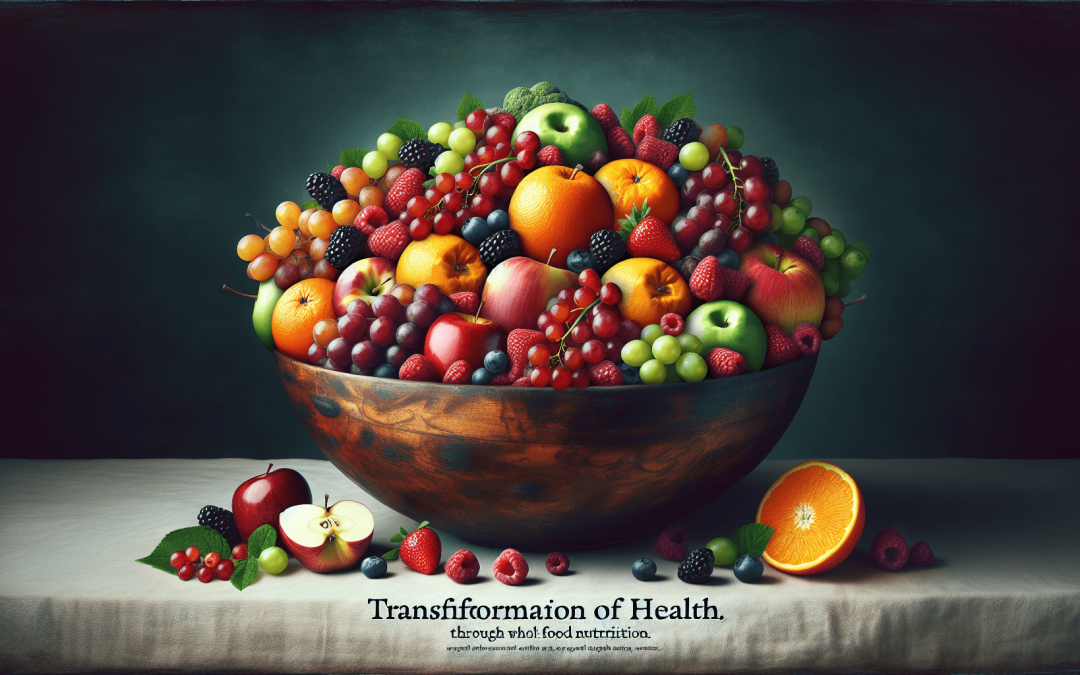Are you ready to take control of your health and transform your life? Look no further than the power of whole food nutrition. In this article, we will explore the incredible benefits of incorporating whole foods into your diet and how they can positively impact your overall well-being. From boosting your immune system to increasing energy levels, whole food nutrition is the key to unlocking a happier and healthier you. Discover the secrets to a balanced and nourished body, and embark on a journey towards a transformed life through the power of whole food nutrition.
What is Whole Food Nutrition
Definition of Whole Food Nutrition
Whole food nutrition refers to the practice of consuming foods in their most natural and unprocessed form, as close to their original state as possible. It involves eating a variety of nutrient-dense foods that are minimally refined or processed, such as fruits, vegetables, whole grains, lean proteins, and healthy fats. Whole food nutrition focuses on providing the body with the necessary nutrients, vitamins, minerals, and antioxidants needed for optimal health and wellness.
Difference between Whole Food Nutrition and Processed Food
The main difference between whole food nutrition and processed food lies in the way they are prepared and the nutrients they contain. Whole foods are minimally processed and retain their natural form, meaning they are not stripped of their nutritional value. On the other hand, processed foods undergo various forms of processing that often involve adding unhealthy additives, preservatives, and artificial flavors. This processing can significantly deplete the nutrient content and increase the presence of unhealthy ingredients such as added sugars, unhealthy fats, and sodium.
Benefits of Whole Food Nutrition
Improved Nutrient Absorption
One of the key benefits of whole food nutrition is improved nutrient absorption. Whole foods are packed with essential nutrients in their natural form, making it easier for the body to digest, absorb, and utilize these nutrients. Unlike processed foods, which often contain empty calories and lack essential nutrients, whole foods provide a wide range of vitamins, minerals, fiber, and phytochemicals that are essential for maintaining optimal health and well-being.
Higher Antioxidant Content
Whole foods are rich in antioxidants, which play a vital role in protecting the body against oxidative stress and reducing the risk of chronic diseases. Antioxidants help to neutralize free radicals, harmful molecules that can damage cells and contribute to the development of diseases such as cancer, heart disease, and neurodegenerative disorders. By incorporating whole foods into your diet, you can increase your antioxidant intake and support overall health.
Reduced Risk of Chronic Diseases
A major advantage of consuming whole foods is a reduced risk of chronic diseases. Whole foods, particularly fruits, vegetables, and whole grains, are associated with a lower incidence of conditions such as heart disease, type 2 diabetes, certain cancers, and obesity. The high nutrient content and low presence of unhealthy additives in whole foods contribute to these protective effects. By prioritizing whole food nutrition, you can help prevent the onset of chronic diseases and promote long-term health.
Better Digestive Health
Whole foods are beneficial for digestive health due to their high fiber content. Fiber plays a crucial role in maintaining regular bowel movements, preventing constipation, and promoting a healthy gut microbiome. Additionally, whole foods are less likely to cause digestive discomfort or inflammation compared to processed foods, which often contain additives that can irritate the digestive system. By incorporating a variety of whole foods into your diet, you can support digestive health and improve overall well-being.

Whole Food Nutrition vs. Supplements
The Importance of Whole Foods
While supplements can provide certain nutrients, they cannot fully replicate the benefits of consuming whole foods. Whole foods contain a complex combination of nutrients and phytochemicals that work together synergistically to support optimal health. Additionally, whole foods provide essential dietary fiber, which is often lacking in supplements. By prioritizing whole foods, you can ensure that your body receives a well-rounded array of nutrients and essential compounds necessary for overall well-being.
Shortcomings of Supplements
While supplements can be useful in certain situations, they are not a substitute for whole foods. Supplements often lack the same nutritional value as whole foods and may contain synthetic or isolated forms of nutrients. Furthermore, the body may not absorb and utilize these nutrients as efficiently as those obtained from whole foods. In some cases, high-dose supplementation may also pose risks, as nutrients can interact with each other and with medications. It is important to consult with a healthcare professional before starting any supplement regimen.
Key Components of Whole Food Nutrition
Fruits and Vegetables
Fruits and vegetables are essential components of whole food nutrition. They are rich in fiber, vitamins, minerals, and antioxidants. By incorporating a variety of colors and types of fruits and vegetables into your diet, you can maximize your intake of essential nutrients. Leafy greens, berries, citrus fruits, cruciferous vegetables, and root vegetables are particularly nutrient-dense choices.
Whole Grains
Whole grains are an important source of fiber, B vitamins, and minerals in a whole food diet. Unlike refined grains, which have been stripped of their bran and germ, whole grains retain these nutrient-rich components. Examples of whole grains include brown rice, quinoa, oats, barley, and whole wheat. Aim to replace refined grain products with whole grain alternatives to increase your nutrient intake.
Lean Protein
Lean protein is crucial for muscle growth, repair, and overall health. Incorporating lean protein sources such as poultry, fish, beans, lentils, and tofu into your diet can help fulfill your protein needs while minimizing saturated fat intake. Plant-based protein sources are particularly beneficial as they also provide fiber and a variety of essential nutrients.
Healthy Fats
Healthy fats, such as those found in avocados, nuts, seeds, and olive oil, are an important component of whole food nutrition. These fats provide essential fatty acids, which support brain function, regulate inflammation, and promote heart health. It is important to consume healthy fats in moderation as part of a balanced diet.

Strategies for Incorporating Whole Foods into Your Diet
Meal Planning and Preparation
Meal planning and preparation are effective strategies for incorporating whole foods into your diet. By planning your meals ahead of time, you can ensure that you have a variety of nutrient-dense whole foods on hand. Prepare meals in batches and store them in portion-sized containers to make healthy eating more convenient, especially during busy weekdays.
Shopping Tips
When shopping for whole foods, opt for fresh produce, whole grains, lean proteins, and healthy fats. Choose locally sourced and organic options when possible to minimize exposure to pesticides and ensure the highest nutrient content. It is also helpful to shop the perimeter of the grocery store, where fresh and unprocessed foods are typically located.
Food Storage
Proper food storage is key to maintaining the freshness and nutritional quality of whole foods. Store fruits and vegetables in the refrigerator to preserve their freshness and nutrient content. Dry goods such as whole grains, nuts, and seeds should be stored in airtight containers in a cool, dark place to prevent spoilage and maintain their nutritional value.
Cooking Techniques
Experimenting with different cooking techniques can enhance the flavors and nutritional benefits of whole foods. You can steam, roast, grill, or sauté vegetables to retain their natural flavors and nutrients. Avoid overcooking as this can lead to nutrient loss. Incorporating herbs, spices, and healthy oils can also enhance the taste and nutritional profile of your meals.
Whole Food Nutrition and Weight Loss
Importance of Portion Control
While whole foods are nutrient-dense and beneficial for weight loss, portion control is still important. Even healthy foods should be consumed in moderation to maintain a calorie balance. Be mindful of your portion sizes and listen to your body’s hunger and fullness cues to avoid overeating.
Choosing Nutrient-Dense Foods
When aiming for weight loss, it is essential to choose nutrient-dense whole foods that provide maximum nutritional value with fewer calories. Focus on incorporating fruits, vegetables, whole grains, and lean proteins into your meals. These foods are typically low in calories and high in fiber, which helps to promote satiety and prevent overeating.
Controlling Caloric Intake
Whole foods are generally lower in calories compared to processed foods, making it easier to control caloric intake. However, it is still important to be mindful of your overall calorie consumption. Pay attention to the energy density of your meals and snacks to ensure you are not consuming excessive calories. Balancing portion sizes and incorporating a variety of whole foods can help maintain a healthy caloric intake.
Combining Whole Foods with Exercise
When aiming for weight loss, combining a whole food diet with regular exercise can be highly beneficial. Exercise not only helps to burn calories but also supports overall health, muscle maintenance, and metabolism. Engage in a combination of cardiovascular exercise, strength training, and flexibility exercises for optimal results.

Addressing Common Challenges
Availability and Accessibility of Whole Foods
One common challenge in adopting a whole food diet is the availability and accessibility of these foods. It may be more challenging to find fresh, unprocessed foods in certain areas or during certain seasons. However, exploring local farmers’ markets, joining a community-supported agriculture (CSA) program, or growing your own fruits, vegetables, and herbs can help overcome this challenge. Additionally, frozen and canned whole foods can be a convenient alternative when fresh options are limited.
Cost-Effectiveness of Whole Foods
Another challenge faced by some individuals is the perception that whole foods are more expensive than processed alternatives. However, with proper planning and budgeting, it is possible to consume a whole food diet without breaking the bank. Buying in bulk, purchasing seasonal produce, and opting for frozen or canned whole foods can be cost-effective strategies. Additionally, reducing consumption of unhealthy processed foods can free up finances to invest in wholesome ingredients.
Adapting to Dietary Restrictions
Adopting a whole food diet can be challenging for individuals with dietary restrictions or food allergies. However, with creativity and resourcefulness, it is possible to adapt and modify your diet to meet your specific needs. Researching and exploring alternative recipes, cooking methods, and ingredient substitutions can help ensure that you are still able to enjoy a variety of whole foods while adhering to your dietary restrictions.
The Role of Whole Food Nutrition in Disease Prevention
Cardiovascular Health
Whole food nutrition plays a significant role in the prevention of cardiovascular diseases. Diets rich in fruits, vegetables, whole grains, lean proteins, and healthy fats have been associated with a reduced risk of heart disease. These whole foods provide essential nutrients, antioxidants, and fiber that support heart health, lower cholesterol levels, and reduce inflammation.
Type 2 Diabetes
Research has shown that a whole food diet can help prevent and manage type 2 diabetes. Whole foods such as fruits, vegetables, whole grains, and lean proteins have a lower glycemic index, meaning they have a more gradual impact on blood sugar levels. Additionally, the high fiber content in whole foods can help regulate blood sugar levels and improve insulin sensitivity.
Cancer
Whole food nutrition is also associated with a lower risk of certain cancers. Diets rich in fruits, vegetables, whole grains, and lean proteins provide antioxidants, phytochemicals, and fiber that possess cancer-fighting properties. These nutrients help to reduce inflammation, neutralize free radicals, and support the body’s natural defense mechanisms against cancerous cell development.
Autoimmune Diseases
While more research is needed, some evidence suggests that whole food nutrition can play a role in managing autoimmune diseases. A diet rich in anti-inflammatory whole foods can help reduce symptoms and support overall immune system function. Incorporating foods such as fatty fish, leafy greens, berries, and nuts can help reduce inflammation and support optimal immune system health.

Educational Resources for Whole Food Nutrition
Books
There are numerous books available that provide comprehensive information and guidance on whole food nutrition. Some popular titles include “The Whole Foods Diet” by John Mackey and Alona Pulde, MD, “Whole: Rethinking the Science of Nutrition” by T. Colin Campbell, PhD, and “In Defense of Food” by Michael Pollan.
Online Courses
Online platforms offer a wide range of courses on whole food nutrition. Websites such as Coursera, Udemy, and EdX offer courses taught by experts in the field. These courses cover various aspects of whole food nutrition, from basics to advanced topics, and provide a structured and interactive learning experience.
Documentaries
Documentaries can be a valuable resource for learning about the benefits of whole food nutrition. Films such as “Forks Over Knives,” “Food, Inc.,” and “What the Health” shed light on the importance of whole foods and offer insights into the impact of our food choices on health, the environment, and animal welfare.
Conclusion
Incorporating whole food nutrition into your lifestyle can have a profound impact on your health and well-being. By prioritizing nutrient-dense whole foods and minimizing processed and unhealthy options, you can experience improved nutrient absorption, higher antioxidant content, reduced risk of chronic diseases, and better digestive health. Whole foods also play a crucial role in weight loss, disease prevention, and supporting overall health. Despite common challenges related to availability, cost, and dietary restrictions, strategies such as meal planning, smart shopping, and exploring alternative options can help overcome these obstacles. Educational resources such as books, online courses, and documentaries provide valuable information and guidance on whole food nutrition. Prioritizing whole food nutrition is a powerful step towards transforming your health and achieving optimal well-being.






